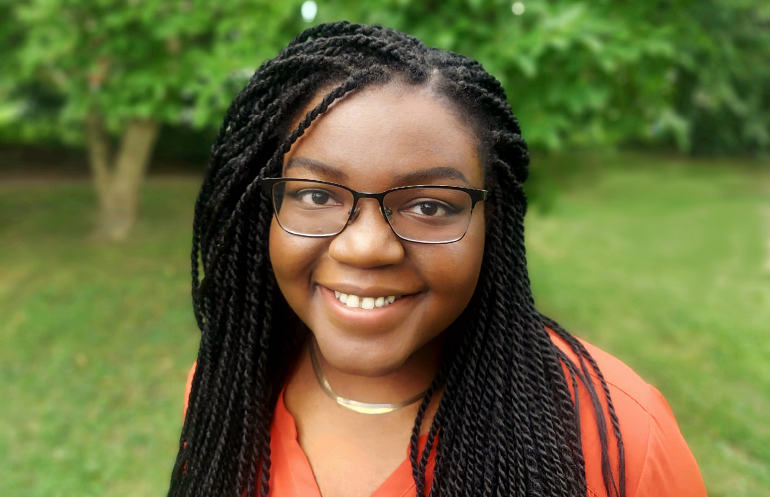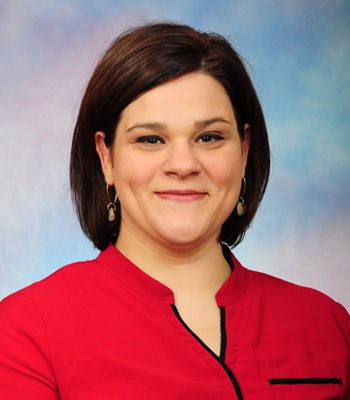
Wayne State University doctoral student Abigail Fielder has seen the hardships that cancer brings, driving her to find a way to improve disease survivorship by enrolling in the Cancer Biology Graduate Program at the School of Medicine and the Barbara Ann Karmanos Cancer Institute in her hometown of Detroit.
“African American women are disproportionally affected by hormone receptor positive (HR+) breast cancer compared to European American women,” she said. “Specifically, I am studying the role of genetic ancestry, the genes an individual receives from the generations before them, and how it might change the biology of this subtype of tumors between African American and European American women. The results from my work will provide the knowledge needed to develop more specific therapies to improve survival and reduce disparities among women with HR+ breast cancer.”

Fielder, along with her mentor, Associate Professor of Oncology Kristen Purrington, Ph.D., are the first student and advisor in Wayne State history to earn spots in the Howard Hughes Medical Institute’s Gilliam Fellows Program. They join 49 other student-advisor pairs hailing from 37 institutions across the country.
Fielder’s doctoral thesis, “Examining racial differences in molecular heterogeneity and endocrine sensitivity in hormone receptor positive breast cancer,” investigates the biological factors that result in differences in HR+ breast cancer survival between African American women and European American women.
Gilliam Fellowships are given in recognition of outstanding research in the awardee’s respective scientific fields and their commitment to building a more inclusive scientific ecosystem. Each student-adviser pair receives an annual award totaling $53,000 for up to three years.
“The Gilliam Fellowship is a highly competitive fellowship program, and Abby’s award is a recognition not only of her scientific achievements but of her clear trajectory toward an impactful career as a leader in science,” Dr. Purrington said. “Abby has a genuine curiosity and passion for health disparities research and contributing knowledge to the efforts of developing precision medicine approaches that benefit diverse populations. She is not only a creative and talented student, but she brings an extraordinarily empathetic perspective to her work that is rooted in her family’s experience with cancer and membership in a community that is underrepresented in biomedical research.”
Participants are expected to attend and present their research at the Annual Fellows’ Meeting in Chevy Chase, Md.
“It is truly an honor to receive this prestigious award, and I am excited to be a Gilliam Fellow. I am grateful to Dean Amanda Bryant-Friedrich and the graduate school for the nomination, as well as my thesis advisor, Dr. Purrington, for creating an environment in which to excel. I would also like to offer my gratitude to everyone in my life who has supported me thus far as I continue to grow as a leader in science,” Fielder said.
As an undergraduate at Wayne State, Fielder conducted research at the Barbara Ann Karmanos Cancer Institute under the mentorship of Professor of Oncology Lisa Polin, Ph.D., director of the Animal Model and Therapeutic Evaluation Core at Karmanos.
“During this time, I had the opportunity to be a part of various oncological studies, which then allowed me to learn of the unique research opportunities and resources available here, some of which I am utilizing in my thesis work,” Fielder said.
She holds a dual bachelor’s degree from the WSU in Biological Sciences and Romance Languages, with a concentration in Spanish.
“From my undergraduate research in preclinical therapeutic evaluation and my current training in molecular epidemiology, I became fascinated by how certain genetic and molecular differences affect oncological therapeutic response,” she said. “Elucidating these factors would result in more targeted treatments and improve survivorship among cancer patients, particularly those in disparaged and underrepresented populations. When choosing a graduate advisor, Dr. Purrington's research in assessing the molecular heterogeneity in hormone receptor-positive (HR+) breast cancer aligned with my research interests.”